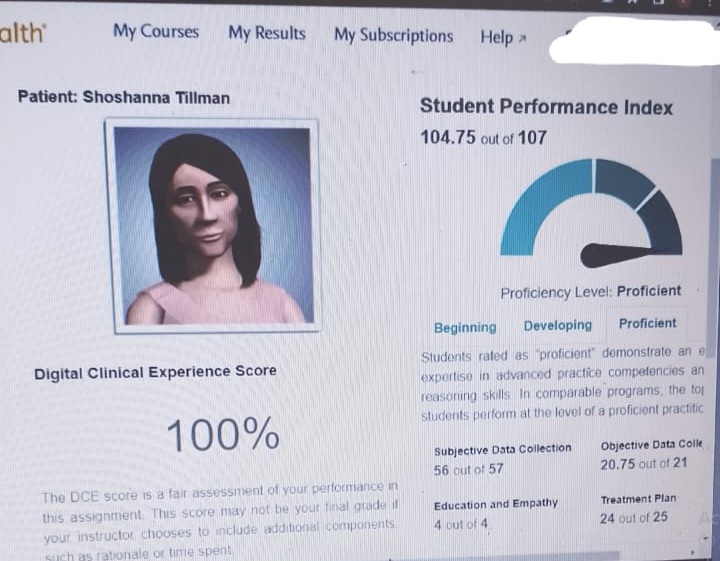Follow Up Sick Visit: Musculoskeletal Shoshanna Tillman Shadow Health treatment plan
WE GUARANTEE A DCE SCORE OF ABOVE 95% AND HANDLE THE SOAP NOTE
Treatment Plan: 25 Of 25 (100.00%)
Primary Diagnosis
Review your answers for the Problem Selection activities. You receive one point for each correct diagnosis, and one point for each correct evidence linked to a correct diagnosis. If there are multiple correct diagnoses, you will also receive a point for correctly selecting which diagnosis is the primary diagnosis.
| Learner Selection | Model Documentation |
|
Diagnosis: xx Identified as primary Evidences: xx Pain not associated with trauma xx Learner Rationale: The patient complains of xx Score: 5 out of 5 |
Diagnosis: xx Primary: Yes Evidences: xx Pain not associated with trauma Model Rationale: At this point in the diagnostic process, you can only provide Mrs. Tillman with preliminary diagnoses. In order to determine a definitive diagnosis, more diagnostic testing is required. In primary care, it is common to have multiple concerns in one visit. These two diagnoses may be related or are two unrelated situations, nonetheless, each diagnosis requires individual diagnostic investigation. Mrs. Tillman’s primary diagnosis is xx, while her secondary diagnosis is xx. The preliminary diagnosis of xx is supported by the evidence collected in the physical exam and reported by Mrs. Tillman: tenderness with palpation, pain not associated with xx The secondary diagnosis of fatigue is supported by the evidence reported by Mrs. Tillman: an unusual lack of energy, feeling tired, and having difficulty completing tasks due to feeling tired Follow Up Sick Visit: Musculoskeletal Shoshanna Tillman Shadow Health treatment plan. When making a disease diagnosis, it is important to note that disease diagnosis documentation is permanent in the patient’s records and cannot be undone. Therefore, if you do not have the evidence and diagnostic testing to support a disease diagnosis it is best to collect more data before determining a definitive diagnosis, even if the patient’s signs and symptoms point to a likely disease. |
Additional Diagnosis
| Learner Selection | Model Documentation |
|
Diagnosis: xx Evidences: xx Feeling tired Unusual lack of energy Learner Rationale: Patient complains of fatigue, geneal stress, sadness and anxiety. Score: 4 out of 4 |
Diagnosis: xx Evidences: xx Feeling tired Unusual lack of energy Model Rationale: At this point in the diagnostic process, you can only provide Mrs. Tillman with preliminary diagnoses. In order to determine a definitive diagnosis, more diagnostic testing is required. In primary care, it is common to have multiple concerns in one visit. These two diagnoses may be related or are two unrelated situations, nonetheless, each diagnosis requires individual diagnostic investigation. Mrs. Tillman’s primary diagnosis is xx, while her secondary diagnosis is xx. The preliminary diagnosis of xx is supported by the evidence collected in the physical exam and reported by Mrs. Tillman: tenderness with palpation, pain not associated with trauma, and bilateral pain. The secondary diagnosis of xx is supported by the evidence reported by Mrs. Tillman: an unusual lack of energy, feeling tired, and having difficulty completing tasks due to feeling tired. When making a disease diagnosis, it is important to note that disease diagnosis documentation is permanent in the patient’s records and cannot be undone. Therefore, if you do not have the evidence and diagnostic testing to support a disease diagnosis it is best to collect more data before determining a definitive diagnosis, even if the patient’s signs and symptoms point to a likely disease Follow Up Sick Visit: Musculoskeletal Shoshanna Tillman Shadow Health treatment plan. |
Review Your Answers For The Diagnostic Testing: Labs And Imaging Activity. You Receive One Point For Each Correct Differential Diagnosis Selected, And One Point For Each Correct Diagnostic Test Linked To A Correct Differential Diagnosis.
| Learner Selection Follow Up Sick Visit: Musculoskeletal Shoshanna Tillman Shadow Health treatment plan |

